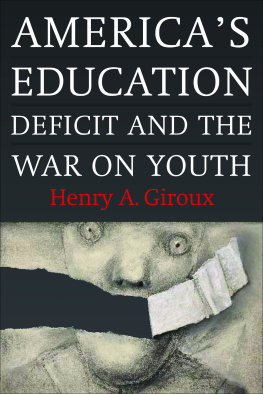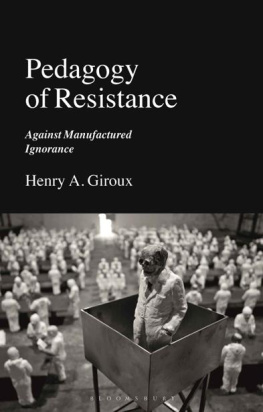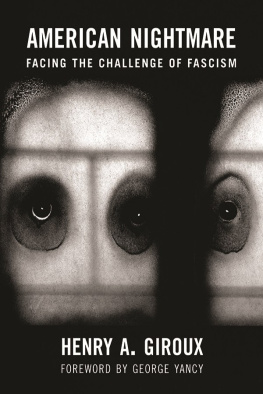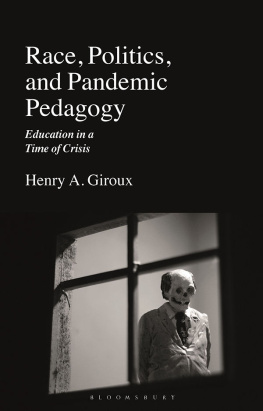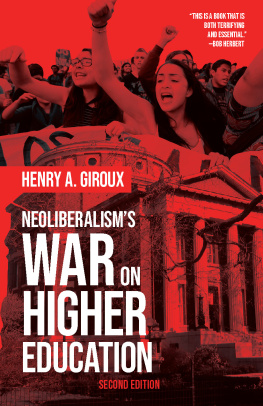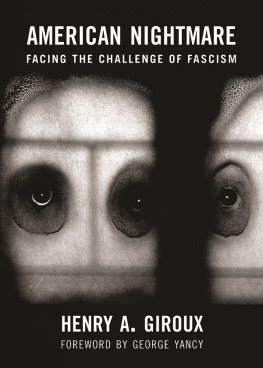Thank you for buying this ebook, published by NYU Press.
Sign up for our e-newsletters to receive information about forthcoming books, special discounts, and more!
Sign Up!
About NYU Press
A publisher of original scholarship since its founding in 1916, New York University Press Produces more than 100 new books each year, with a backlist of 3,000 titles in print. Working across the humanities and social sciences, NYU Press has award-winning lists in sociology, law, cultural and American studies, religion, American history, anthropology, politics, criminology, media and communication, literary studies, and psychology.
Americas Education Deficit and the War on Youth
Introduction: Challenging Casino Capitalism and Authoritarian Politics in the Age of Disposability
THERE IS BY NOW an overwhelming catalogue of evidence revealing the depth and breadth of the corporate- and state-sponsored assaults being waged against democracy in the United States. Indeed, it appears that the nation has entered a new and more ruthless historical era, marked by a growing disinvestment in the social state, public institutions, and civic morality. The attack on the social state is of particular importance because it represents an attempt to shift social protections to the responsibility of individuals while at the same time privatizing investments in the public good and undermining the bonds of communal solidarity. The renowned sociologist Zygmunt Bauman makes this clear in his definition and defense of the social state:
A state is social when it promotes the principle of the communally endorsed, collective insurance against individual misfortune and its consequences.... And it is the same principle which lifts members of society to the status of citizensthat is, makes them stake-holders in addition to being stock-holders, beneficiaries but also actors responsible for the benefits creation and availability, individuals with acute interest in the common good understood as the shared institutions that can be trusted to assure solidity and reliability of the state-issued collective insurance policy. The application of that principle may, and often does, protect men and women from the plague of povertymost importantly, however, it stands a chance of becoming a profuse source of solidarity able to recycle society into a common, communal good, thanks to the defense it provides against the horror of misery, that is, of the terror of being excluded, of falling or being pushed over the board of a fast-accelerating vehicle of progress, of being condemned to social redundancy and otherwise designed to human waste.
Matters of politics, power, ideology, governance, economics, and policy now translate unapologetically into a systemic disinvestment in those public spheres that traditionally provided the minimal conditions for social justice, dissent, and democratic expression. The reign of the commodity, with its growing economy of individualism, privatization, and deregulation, offers a market solution for all of societys problems. Yet, given that the apostles of neoliberalism work tirelessly to destroy with naked power the numerous essential institutions of social justice and social protections that exemplify the social state, it is clear that solving societys problems is not their goal. Neoliberalism aims to enhance the wealth and power of those already rich. No longer responsive to the social contract and the preservation of labor, neoliberalism shifts into a mode of elimination that targets most of usalong with our environmentas waste products awaiting managed disposal. Unfortunately, neoliberalism, or what might better be called casino capitalism, has become the new normal.
Unabashed in its claim to financial power, self-regulation, and a survival of the fittest value system, neoliberalism not only undercuts the formative culture necessary for producing critical citizens and the public spheres that nourish them, it also facilitates the conditions for producing a bloated defense budget, the prison-industrial complex, Regrettably, it is not democracy, but authoritarianism, that remains on the rise in the United States as we move further into the twenty-first century.
The Politics of Fraud
The 2012 U.S. presidential election took place at a pivotal moment in this transformation away from democracy, a moment in which formative cultural and political realms and forces, including the rhetoric used by election candidates, appeared saturated with celebrations of war and social Darwinism. Accordingly, the possibility of an even more authoritarian and ethically dysfunctional leadership in the White House in 2013 caught the attention of a number of liberals and other progressives in the United States. American politics in general, and the 2012 election in particular, presented a challenge to progressives, whose voices in recent years have been increasingly excluded from both the mainstream media and the corridors of political power. Instead, the media played up the apocalyptic view of the Republican Partys fundamentalist warriors, who seemed fixated on translating issues previously seen as non-religioussuch as sexual orientation, education, identity, and participation in public lifeinto the language of a religious revival and militant crusade against evil.
How else to explain Republican vice-presidential nominee Paul Ryans claim that the struggle for the future is a fight of individualism versus collectivism, with its nod to McCarthyism and the cold war
There is more at work here than simply a ramped-up version of social Darwinism, with its savagely cruel ethic of reward the rich, penalize the poor, [and] let everyone fend for themselves. There is also a full-scale attack on the social contract, the welfare state, economic equality, and any viable vestige of moral and social responsibility. As Robert OSelf argues, the social contract is crucial to what it means for Americans to lead a decent life. At the same time, he wonders if there is a place for women in the Republican Partys view of the contract. Of course, he could easily have added youth, people of color, immigrants, the elderly, and the unemployed. He writes:


